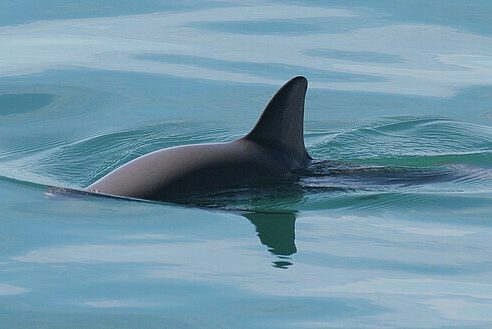
The International Whaling Commission (IWC) has issued an unprecedented “extinction alert,” marking a historic moment in its 70-year history. This alert is a dire warning about the impending peril faced by the vaquita, the world’s smallest and most critically endangered marine mammal.
Recent research has revealed a harrowing statistic: there are now just 10 vaquita individuals left in the world. These small porpoises are exclusive to the Gulf of California in Mexico, and their plight stems from a lethal threat – entanglement in fishing nets known as “gillnets.” These gillnets, once legal but now banned in the region, have pushed the vaquita to the brink of extinction.
The scientific committee of the IWC expressed profound concerns regarding the vaquita’s survival and issued this alert to emphasize the urgent actions required to rescue the species. It stated that the extinction of the vaquita is virtually inevitable unless all gillnets are replaced with alternative fishing gear that can protect both the porpoise and the livelihoods of local fishermen.
“If this doesn’t happen now, it will be too late,” it said.
Dr Lindsay Porter, the vice-chair of the IWC’s scientific committee said: “We wanted, with the extinction alert, to send the message to a wider audience and for everyone to understand how serious this is.”
The vaquita, measuring approximately 1.2-1.5 meters, frequently becomes ensnared in gillnets, which are flat fishing nets suspended vertically in the water. Poachers employ these nets to target the totoaba, an endangered fish highly sought after for its swim bladder, which holds considerable value in Chinese medicine and fetches substantial profits on the black market in China and Hong Kong. During the surge in totoaba trade, the vaquita’s population has plummeted dramatically, dropping from 567 individuals to just 10 over the past decade.
In 2022, the Mexican navy, in collaboration with government agencies, took steps to deter illegal gillnet fishing and safeguard the vaquita. They placed concrete blocks in a designated “zero tolerance area” and intensified enforcement efforts. However, there is evidence that illegal fishing activity has shifted to the outskirts of this zone, creating new challenges.
The committee, comprised of 200 eminent scientists, acknowledged that the deterrent structures showed promise but required ongoing monitoring. The involvement of organized crime in the totoaba fishery and the difficulties in enforcing fishing regulations at sea pose formidable obstacles to conservation efforts.
On a somewhat hopeful note, there is evidence that the vaquita species is not yet doomed. In the past year, at least one baby vaquita has been spotted, a sign that some individuals remain healthy and capable of reproduction.
“There is at least one brand new baby vaquita” said Porter. “They haven’t stopped breeding. If we can take away this one pressure, the population may recover. We can’t stop now.”
Nevertheless, the broader issue of bycatch, or unintentional capture of non-target species, continues to cast a dark shadow over marine life. It is estimated that bycatch is responsible for the deaths of approximately 300,000 whales, dolphins, and porpoises annually, underscoring the urgency of addressing this pervasive problem to protect the world’s precious marine biodiversity.
——————————————————————————
At Natural World Fund, we are passionate about stopping the decline in our wildlife.
The decline in our wildlife is shocking and frightening. Without much more support, many of the animals we know and love will continue in their decline towards extinction.
When you help to restore a patch of degraded land through rewilding to forests, meadows, or wetlands, you have a massive impact on the biodiversity at a local level. You give animals a home and food that they otherwise would not have had, and it has a positive snowball effect on the food chain.
We are convinced that this is much better for the UK than growing lots of fast-growing coniferous trees, solely to remove carbon, that don’t actually help our animals to thrive.
This is why we stand for restoring nature in the UK through responsible rewilding. For us, it is the right thing to do. Let’s do what’s right for nature!
Donate today at https://naturalworldfund.com/ and join in the solution!

